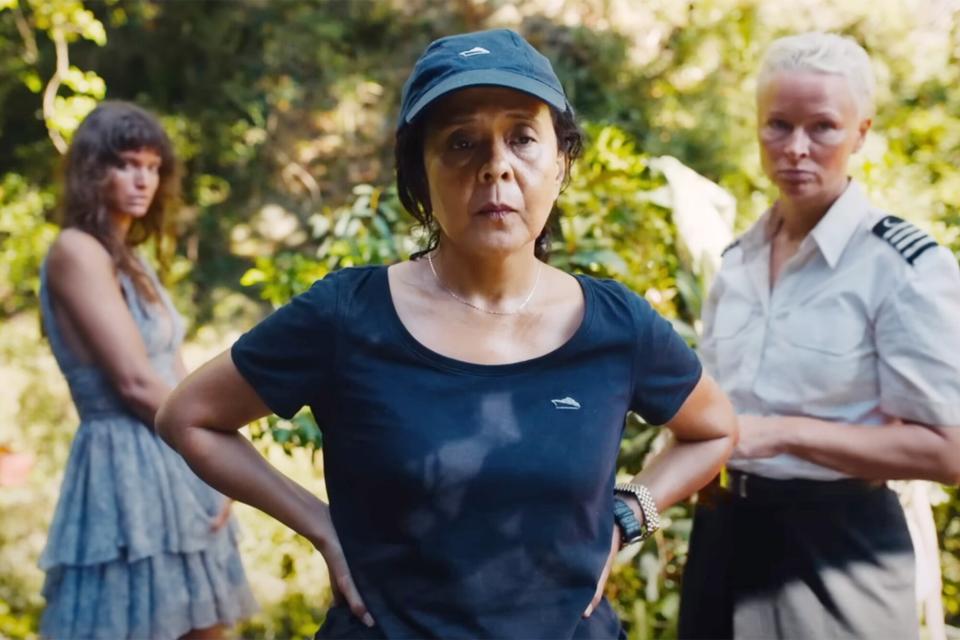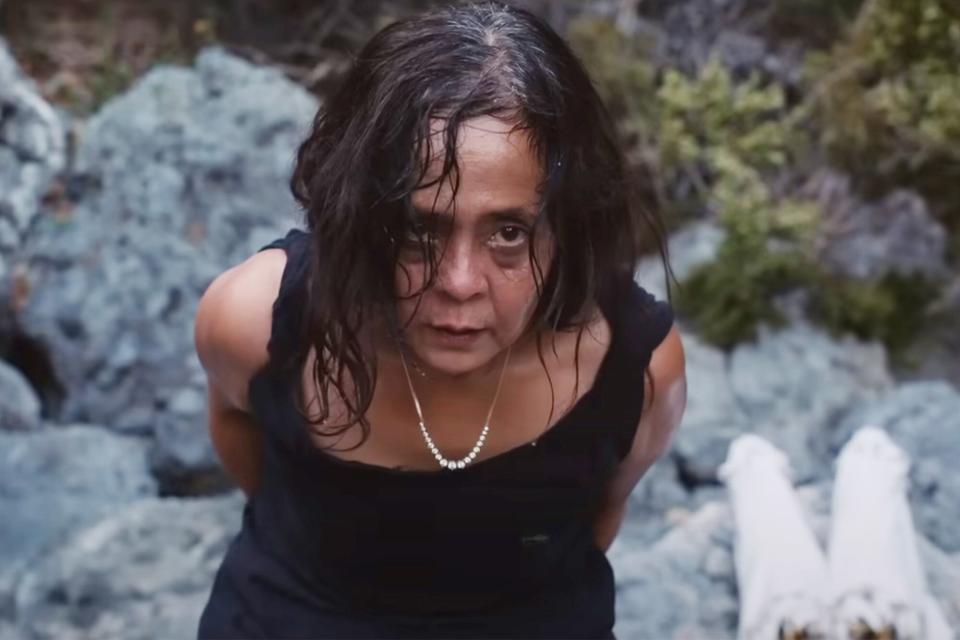Triangle of Sadness breakout star Dolly de Leon explains the movie's intense ending

- Oops!Something went wrong.Please try again later.
- Oops!Something went wrong.Please try again later.
- Oops!Something went wrong.Please try again later.
Warning: This story contains spoilers for Triangle of Sadness.
One of the year's most acclaimed movies is finally out in U.S. theaters this weekend. Triangle of Sadness won the Palme d'Or at Cannes Film Festival this summer, the second time that director Ruben Ostlund has been awarded the honor. But for all that prestige, Triangle of Sadness is a raucous satire of class, beauty, and white privilege, following the passengers on a luxury yacht cruise as their trip gets upended: First by a violent burst of vomiting that affects them all during a fancy dinner, and then by a shipwreck on a seemingly deserted island.
As the movie progresses, Filipina actress Dolly de Leon emerges as the breakout star. Her character Abigail goes from a lowly worker on the yacht, tasked with the unenviable job of cleaning the toilets of the rich and powerful, to the leader of the island-dwelling survivors.
EW caught up with de Leon to discuss her experience on the film, working with the late actress Charlbi Dean, and the film's violently ambiguous ending.

Neon/Everett Charlbi Dean, Dolly De Leon, and Vicki Berlin in 'Triangle of Sadness.'
ENTERTAINMENT WEEKLY: How did you approach the acting challenge of carrying the movie on your shoulders for that final act?
DOLLY DE LEON: A lot of meditation. I'm not even exaggerating. I was nervous every single day going on set and it was like going up on the stage of a theater. It felt that way every single day. That's when I realized I had to start meditating. I don't really meditate usually, but I had to do that because it was the only way I could relax myself. I meditated every single night before going to bed so that I could just ground myself and keep myself centered and just focus on the job, on the task.
That must have been particularly helpful because one of the things that's going on with Abigail in the island sequence of the movie is that she is able to stay relatively calm in this crazy situation and know what to do when everyone else is lost.
Yeah, exactly. And I think that the reason why she's so calm is because she's relishing in everyone's state of panic. She is enjoying seeing them suffering a little bit because she was the one suffering before. Now they're suffering so she enjoys it.
What was it like working with Ruben as a director? How did he talk you through the character and the film?
Going into it, of course I was very nervous, because I didn't really know much about him or his directing style. I knew that he would do a lot of takes, but that's it. I didn't really know about his temperament or what his mood was like. But during our workshops, I was able to get a feel of what kind of person he was. He's a very sweet guy! He's really thoughtful and caring and obviously very intelligent. Immediately during the workshop I already was able to feel a little more at ease knowing that he's an accessible person. Then when we started filming, he does tend to be intense sometimes, but that's not from anger, it's coming from a space of passion because he's really passionate about his work and he really wants to come up with the best results.I saw that and I understood it because I tend to be that way sometimes too, when I get very frustrated. I tend to be too intense or emotional and people can misinterpret it. I'm not just being angry, it just happens when you're just so passionate about something.
Working with him was a dream. It's really very tiring, physically. But he's just such a joy to work with and he doesn't just take you on set and surprise you. We have rehearsals the day before an actual shoot of a sequence, and we talk about how we see the scene and he talks about how he sees it, and we fix things and make adjustments the day before. It saves time for the actual filming. It puts the actors in a very comfortable space.
I wanted to ask you about working with Charlbi. It's so sad that we lost her shortly after the completion of the movie. The end of the movie, those final scenes, are really just you and her. What can you tell us about what working with her was like as an actress?
Charlbi from the very beginning was the most accessible, approachable co-actor because she greeted me with warmth and with open arms right from the start. When we were shooting that scene of the two of us together, she was so supportive of me because I was carrying that really heavy rock and we were doing so many takes. She was just cheering me on. The shot is of me, but she's down there on the foreground, you can't see her. But she was so supportive and kept telling me, "You look great Dolly, you're doing such a great job!" That really helps a lot, when your peer is giving you that kind of support. I don't think my filming experience of Triangle of Sadness would have been the same if it were another actor playing Yaya. Because Charlbi really... she really... Aside from doing such a great job as an actor, she's a great human. She was a really great human. And yeah, it's so odd that she's not here to share all of this with all of us.
There's this striking moment where Charlbi's character Yaya says, "Don't you miss your kids?" And your character Abigail replies, "I don't have any kids." It's this moment that shows how much the other characters don't really understand her. Did you think about Abigail and where she might have come from? How did you get into her head?
I'm kind of hoping that it translated into the movie somehow because there has to be a solid backstory about why she makes the choices that she makes in the story. Why would she not want to go back to civilization? Why would she want to stay on the island? Because she has nothing to go back to. So definitely, yeah, I had to create a backstory of that she doesn't have any children. And actually that line was added. I asked Ruben if we could add that line. It needed to be said.
Maybe some people will think that it is over-explaining but I think it really had to be said because it has to be justified. Why would she even contemplate on doing what she wanted to do in the end? And also why can she fish? Why can she build a fire? Not everyone in the Philippines can fish and build a fire. What kind of childhood did she have? Why does she know these things? I definitely had a backstory to be able to justify those things. You can't just invent these things out of thin air as an actor. You can't just do that and just trust the script. No, there has to be a justification on me when I'm performing why I'm doing these things. And the back story really helped with that.
Did it make you think about what you might do if you were stuck in a situation like that? The film makes me wonder, "oh God, how useless would I be on an island like that?"
I'd probably be useful, but not as useful as Abigail. I definitely can build a fire because I learned it when I was younger. But taking the role of leader is tougher. I'm a very controlling person, but not when it comes to something like that. Because I'm a people pleaser, so I want everyone to be happy. And I think that's the big difference between Abigail and me, because Abigail at that point on the island, she is definitely not the people pleaser. "No one ever tried to please me in my life, in my career, so why should I try to please anyone else?" That's a big difference. And because of that big difference, then I would also behave very differently. If that situation happened to me. I'd probably be very accommodating, serving people, but with a hug. And not ordering people around, probably asking them, "Hi, could you please do this or that?" Yeah, very different.

Neon/Everett Dolly de Leon in 'Triangle of Sadness.'
The film ends on this note of ambiguity, with Abigail walking toward Yaya with that big rock. Do you think she goes through with the implied violence? Do you think she pauses? Or do you like it resting in the ambiguity?
I really like it resting on that. I think that we can trust the audience enough to come up with their own ending. But of course, I have my own personal take on it as the actor who played Abigail. Definitely I know what Abigail's intention is, and I'm the only one who really knows it. I would love to answer your question, but the truth is it really changes depending on the date.
When I was in Cannes, I really told them straightforward of course she does. Of course she does. But then thinking about it again, maybe she doesn't. She goes through this whole crisis within herself and she's really torn by this decision that she has to make. And she's not a killer. She's never done anything like that to anyone. I think that it's really a very difficult decision to make. It depends on what state of mind you're in when you're watching the film.
What was fun about exploring the ways hierarchies get upended in this movie?
As soon as I read the script, I saw that this was a very important commentary to make on how the world works, especially today with the internet and how everything is influenced by people living these superficial lives and creating this picture of perfection and happiness that we're not even sure if it really exists. I think it's really important that Ruben is brave enough and creative enough to come up with a story like this to put in everyone's faces that all your money and all your fame and all your beauty doesn't mean anything. You are in a place where nothing is provided. Nothing. You have only the bare minimum. Let's see how you live with yourself.
That's really the important thing: How do you live with yourself? It's not only about surviving those conditions, but how do you find happiness now in a place like that? Let's say you're provided with all the food and you can survive and you live, you won't die, but where's the joy? How do you find joy now? You can't take a selfie of yourself and post it anywhere, you can't spend money, you can't buy things. How do you find happiness? That's the question there. And I think that's a really important question. Hopefully the people who watch the film ask themselves, "How do I find joy in the simple pleasures in life?"
Related content:

